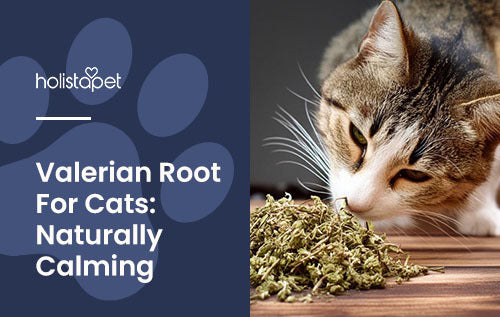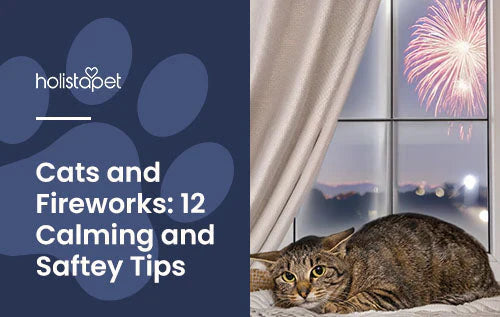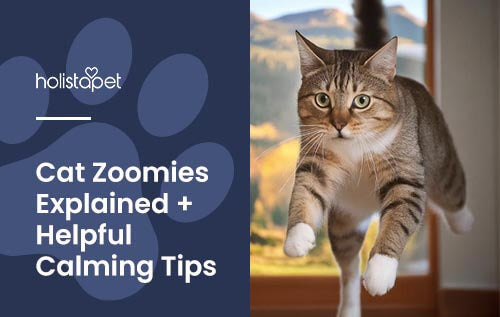Are you a pet parent looking for a natural way to calm your feline friend? Valerian root for cats might be the solution. Famous for its calming effects, this natural plant offers a serene escape for skittish cats.
The herbal sedative can be a safer and gentler solution compared to some synthetic options. Because of this, valerian root has become popular among many pet owners. If you want to take advantage of this holistic alternative for your kitty, read this guide on all things valerian root for cats.
What is Valerian Root?
Valerian (Valeriana officinalis) is a well-known ancient medicinal herb native to Europe and parts of Asia. Its roots contain natural compounds people have used in traditional medicine for centuries. The plant has sweetly scented white and pink flowers and a super pungent smell that's surprisingly appealing to cats.
Today, this flowering herb holds a unique place in cat care. Sometimes called "cat drug" for its effect on feline behavior, valerian root may mimic cat pheromones. It has a scent with a similar effect to cat pheromones, helping kitties feel calm and secure.
The root is typically coarsely chopped into small pieces or ground into a brown and chunky mass. Whether fresh or dried, the essence attracts felines, drawing them into a calmly playful or loving mood. Pet owners find valerian root great for both its effects and natural form. The herbal aid stands out as a powerful yet natural, plant-based option.
Can Cats Take Valerian Root?
Yes, cats can take valerian root because it is generally well-tolerated by most felines. Many pet owners actually find valerian safe and a great alternative to conventional options. However, not all cats will react the same way to this natural herb. While many will enjoy its effects, some might not show a big reaction. A few may not show any reaction at all.
Comparing Valerian to Catnip
Valerian root and catnip are both popular among pet parents, but they affect cats in a few different ways. Catnip typically triggers a brief burst of energy and playful behavior. Meanwhile, valerian tends to promote a more relaxed state.
The active components in catnip, primarily nepetalactone, stimulate felines momentarily. They can exhibit spontaneous bouts of rolling, cheek rubbing, and hyperactivity. In contrast, valerian root contains compounds, including valerenic acid, that help calm the nervous system. It brings a relaxing effect rather than a stimulating effect.
Kitties have a sensitive sense of smell, making them responsive to valerian and catnip. Cats respond to the alluring smell of catnip, which is not offensive to humans. Valerian root, however, has a super pungent smell that might remind us of, maybe, old socks. However, this smell is incredibly enticing for our feline friends, causing longer sniffing and quieter playtime.
Overall, valerian root can be a good catnip alternative. If you use silver vine (another popular herb for felines) instead of catnip, you might want to try valerian for its longer-lasting relaxing effects.
Chemical Elements and Action Mechanism of Valerian
How does valerian root work? It is rich in natural compounds that help promote relaxation. The most significant compounds include valerenic acid, isovaleric acid, and flavonoids. These substances may help to soothe the nervous system and promote relaxation. They interact with the neurotransmitter GABA (gamma-aminobutyric acid) in the brain, enhancing its calming effects in cats.
Effects: Consumption vs Sniffing Interactions
When a cat consumes valerian root, the typical response is calm and relaxation. This response is due to the compounds in the herb that help soothe the nervous system. Positive effects may include reduced worry, less muscle tension, and a calmer demeanor.
When cats sniff valerian root, they may experience benefits similar to those seen with catnip. Valerian contains compounds that can trigger a temporary elevation in mood and playfulness in cats. This response is thought to be due to the presence of actinidine, a compound that stimulates the olfactory system of cats, much like nepetalactone in catnip.
Sniffing valerian root can provide a form of sensory enrichment, encouraging physical activity through play and exploration, which can be especially beneficial for indoor cats. Moreover, this activity might help reduce stress and promote relaxation, making valerian root a useful tool in managing anxious-related behaviors in cats.

Potential Benefits of Valerian for Cats
Valerian root offers a wealth of potential benefits for cats. We'll explain these points more in the next sections, but here’s a quick overview of the key advantages that valerian can offer:
- May Soothe Anxiety and Stress
- Promotes Relaxation and Quality Sleep
- May Enhance Mood
- Supports Overall Health
May Soothe Anxiety and Stress
Valerian root may help to calm the nervous system. It may relieve stress when cats face triggers like thunderstorms, fireworks, or new environments. The soothing properties can especially help young kittens who are naturally skittish or house cats who often get agitated. By incorporating the calming herb into their routine, you, as a pet parent, can help your cat companion maintain calm conduct and a balanced mental state more consistently.
Promotes Relaxation and Quality Sleep
While humans like essential oils to relax, cats love valerian root for promoting relaxation. This natural herb may help kitties fall asleep—and we all know that a well-rested cat is a happier cat. Restless sleepers could benefit from valerian root. By easing cats' transition into sleep, the plant supports adequate rest and helps prevent night-time wakefulness, especially in felines that are a bit older.
May Enhance Mood
With its ability to ease discomfort, valerian root can encourage more engaging and friendly behaviors in felines. Withdrawn cats who feel discomfort or worry may show more social behaviors after taking valerian. Pet parents may notice purring, cuddling, and playing after their pet's exposure to the herb. This mood-enhancing effect may lead to a more balanced emotional state, creating a more playful and affectionate cat.
Supports Overall Health
Adding valerian root to your cat's routine can support their overall health. By promoting calm, valerian helps maintain a healthy balance within the body. This effect can potentially improve immune response and general vitality.
The herb may help relax the muscles and reduce discomfort in cats with mobility issues or soreness. It can help ensure your kitty enjoys their playtime anytime. Also, valerian root may help manage minor digestive issues caused by various stressors. If your cat has an upset stomach, the helpful herb might foster a more relaxed state and contribute to smoother digestion.
How is Valerian Root Given to Cats?
You can administer valerian root to your cat in a few different ways. Here are two of the most common methods:
- Valerian Supplements for Cats. These are available as chews, capsules, tablets, or liquid extracts. Supplements are a simple way to include the herb in your cat's diet, especially if the dose needs to be precise. You can mix supplements with cat food or give them directly to your kitty.
- Valerian Toys for Cats. This method is popular since cats love to chew or cuddle with their toys. Cat toys stuffed with valerian root engage felines in play while promoting relaxation at the same time.
How to Use Valerian With Cats?
You can use valerian root in several ways to enhance your cat's overall wellness. Here's how to make the most of this herb:
- Promote Calm and Relaxation. Supplements like our calming soft chews for cats may promote a sense of calmness and relaxation in cats. You also can sprinkle some dried valerian root directly on your cat's bedding or play areas. Doing so may help reduce anxious behaviors.
- Promote Mental Stimulation. Provide fun cat toys infused with valerian root to entertain and encourage mental engagement in your feline friend. House cats that do not have enough stimuli can become more alert and curious after using valerian.
- Promote Physical Activity. To prevent obesity and boredom, use valerian-infused cat toys, such as small round balls or plush mice. Doing so will promote play.
Dosage and Frequency Suggestions
For supplements, follow the manufacturer's instructions or consult a vet to get the dosage right. Overuse can cause mild irritation or lead to weaker effects over time.
For dried valerian, typically, a small amount of valerian root (like a few pinches) is sufficient to see an effect. You can offer this to your cat up to twice a week. You must observe your cat's reaction and adjust the frequency accordingly.
Remember: Moderation is key. Regular intervals, rather than daily use, are better to maintain the herb's long-term effects and your cat's interest in it.

Are There Potential Risks or Side Effects Involved?
Most felines tolerate valerian root well, but reactions can vary like any dietary supplement or herb. A few cats might experience mild digestive upset, especially if given too much. Overusing the herb can lead to decreased effectiveness over time. In rare cases, it can cause a cat to become overly sedated or lethargic. This can happen if a cat takes the herb in large quantities or too frequently.
Choosing High-Quality Valerian Supplements
When choosing valerian root products for your cat, look for only the best. Here are a few tips:
- Source Transparency. Pick products that clearly state where the valerian is from for authenticity and traceability.
- Pet-Safe. Products specifically designed for animals have dosages and ingredients that are safe for pets.
- Natural Ingredients. Choose supplements that contain no artificial additives, flavors, or preservatives to avoid unnecessary chemicals.
- Third-Party Testing. Look for products that have undergone independent testing to verify their purity and potency.
- Positive Reviews. Check customer reviews to gauge the effectiveness and safety of the product, as reported by other pet owners.
HolistaPet sets a high standard with our pet wellness offerings. Our products are all-natural, gluten-free, non-GMO, animal-safe, third-party lab-tested, and positively reviewed. Try our CBD Calming Chews for Cats for a valerian-infused treat for your cat. Each piece combines the soothing effects of valerian root and broad-spectrum CBD (cannabidiol) for maximum comfort and wellness.
Observable Responses and Reactions to Valerian
Valerian root use can lead to a range of responses in cats. Reaction to the herb can vary, but many cats generally respond well. We'll discuss these more later, but generally, we can classify feline reactions into two categories:
- Normal and Positive Reactions. These are positive behaviors that indicate cats love valerian and are benefitting from it.
- Concerning Reactions. These are less common but important signs that might suggest valerian root isn't suitable for your cat.
Normal and Positive Reactions
When cats respond positively to valerian root, their behavior typically reflects increased comfort and contentment. Here are some common positive reactions:
- Relaxation. A relaxed cat may stretch out more, lie down comfortably, and show a generally calm demeanor.
- Playfulness. A playful kitty might engage more with cat toys and display behaviors like batting, chasing, and cheek rubbing.
- Social Behavior. A friendly cat is more sociable and affectionate towards humans and other pets. They may purr, cuddle, and seek attention.
Concerning Reactions
Some reactions might concern pet owners. Being aware of these can help you respond appropriately:
- Excessive Lethargy. An unusually sleepy or lethargic cat could indicate an overdose.
- Gastrointestinal Issues. While rare, signs of stomach upset, such as vomiting or diarrhea, can occur.
- Changes in Appetite. A significant decrease or increase in appetite might mean the herb does not agree with your pet.
If you notice any of these reactions, stop using valerian root and consult your vet. They can help ensure the health and safety of your beloved cat.
Final Thoughts - Valerian Root for Cats
Whether through supplementation with products like our or playing with valerian-infused toys, this root can potentially elevate your cat's mood and health. Remember to observe your cat's reaction closely and adjust usage as needed. With the right approach, valerian root can become a cherished part of your feline friend's life. Give this great herb a try, and watch your cat thrive in newfound tranquility.


 CBD Oil for Cats - Fast Acting
CBD Oil for Cats - Fast Acting
 CBD Cat Treats - Easy Dose
CBD Cat Treats - Easy Dose
 CBD Calming Chews for Cats - Highly Rated
CBD Calming Chews for Cats - Highly Rated
 CBG Oil for Dogs and Cats - Loved by Thousands
CBG Oil for Dogs and Cats - Loved by Thousands





Leave a comment
All comments are moderated before being published.
This site is protected by hCaptcha and the hCaptcha Privacy Policy and Terms of Service apply.